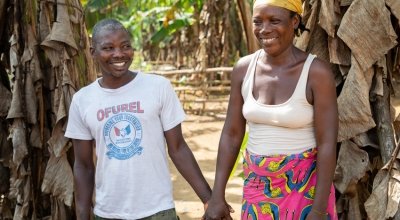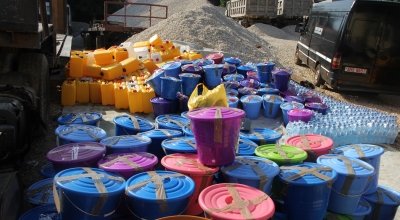
Read our 2024 annual report

Knowledge Hub
Ebola: New outbreak in Democratic Republic of Congo infects hundreds
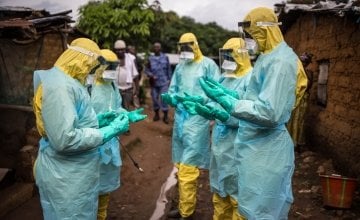
A simple hug can lead to potential death in the Democratic Republic of Congo – where a new outbreak of the Ebola virus has so far infected 341 people and killed 215.
'Preys on human compassion'
Loved ones with early symptoms that include fever, headaches and muscle weakness could spread the fatal disease – for which there is no cure – merely by touching their sick sibling, parent, child or relative.
“Ebola is a disease that preys on human compassion,” said Concern’s Regional Director for Francophone Africa, Reka Sztopa, who witnessed Ebola’s devastating effects during previous outbreaks in Africa when thousands lost their lives.
Those that are most likely to become infected are people helping the sick – health workers, family members and neighbours, or people who come in contact with bodies to prepare them for burial or at funerals."
“It is heart breaking to have to tell loved ones that they can’t touch a sick family member or someone who has died – and that they must instead call on the support of people who are properly trained and equipped. However, this is key to stopping the outbreak."
“Ebola is a devastating and painful disease that kills approximately one in every two people who become ill.”
A country already suffering
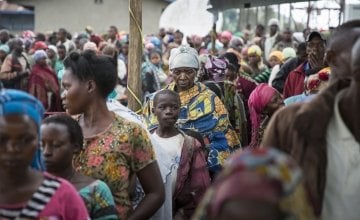
This new outbreak is the last thing that people need in the DRC, which is struggling to control many other crises.
Millions are already suffering from war, food insecurity and hunger issues in the second-largest country in Africa, which is 28 times the size of Ireland with a population of over 78 million.
DRC should be among the richest economies in the world with all its mineral wealth, and it should have a thriving tourism sector, due to its immense natural beauty and habitat – but it is instead battling multiple humanitarian emergencies, including an Ebola epidemic. What's more, most cases are in an area of the country’s North Kivu province where multiple rebels groups are at war, and it has also spread to the neighbouring Ituri province.
“This is probably the first time that there is an Ebola outbreak in an area with active conflict,” said Reka.
“The presence of multiple armed groups adds a further challenge to health and humanitarian workers trying to safely access affected communities.”
Attacks are commonplace and health workers are trying to control the spread in highly dangerous conditions where their own personal safety and security is at risk.
In October, Congolese rebels killed 15 civilians and abducted a dozen children in an attack in Beni, a city in North Kivu where many Ebola cases have been identified.
Two years on
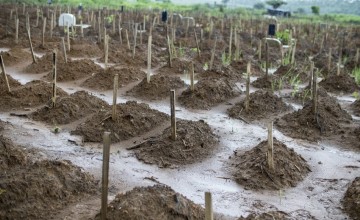
It is just two years since the end of the 2014-2016 West Africa Ebola outbreak when over 28,600 people were infected and over 11,300 of them lost their lives, most of them in Sierra Leone, Liberia and Guinea.
During that outbreak, we implemented a number of prevention and response activities, including playing a critical role in ensuring safe and dignified burials.
The aid agency established a partnership with the Glasnevin Trust, which helped them to introduce the Trust’s system of managing burial records and grave locations in the main cemetery in the capital of Sierra Leone to enable grieving families to visit graves.
'Stopping the spread'
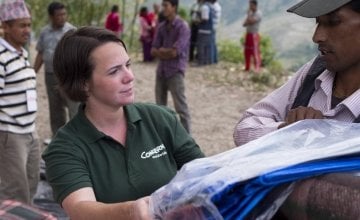
The World Health Organisation (WHO) is leading the response to this new outbreak in DRC with 250 staff trying to prevent its spread to other countries in coordination with the DRC Ministry of Health, Concern and other organisations. However, the country is already extremely poor with millions of people displaced by conflict and suffering from hunger and other illnesses.
“We have 140 staff in DRC,” said Reka, who was part of Concern’s team preventing Ebola’s spread in Liberia and Sierra Leone during the last major outbreak.
“We are monitoring the spread of the disease in North Kivu and participating in preventative measures with other agencies.
Concern has a lot of experience in preventing the spread of Ebola, having responded in the West Africa outbreak, and right now we are working hard to educate communities in how to prevent them from being infected and improving their access to clean water and hand-washing facilities. This is crucially important if we are to stop the spread.
Reka said community engagement is key to successfully controlling outbreaks and that while a new experimental vaccine has had a positive impact in preventing the outbreak from spiralling out of control, the vaccine supply is still limited.
“While Ebola Treatment Centres and experimental treatments and vaccines are an important part of the response to the outbreak, prevention and working closely with communities is the key to ending the outbreak,” she said.
“Vaccination using an experimental vaccine has so far proven to be effective, but supply is limited and is being used for health workers and for contacts of Ebola patients as well as contacts of contacts in a procedure called ‘ring vaccination.’
“What is essential to preventing the further spread of Ebola is working with communities in a process called ‘risk communication and community engagement’ so that they know what Ebola is, how to prevent infection and how to ensure that suspected cases are reported immediately.
“Community sensitisation is key because the earlier treatment starts, the higher the chances of survival and the less likely that other people are contaminated.”
Very high risk of outbreak spreading
The WHO posts regular updates about the Ebola outbreak on its website and recently said that “security incidents” and “clashes between rebel and government forces resulting in civilian deaths” were causing community distress and “severely impeding response activities.”
They said the risk of the outbreak spreading to other provinces in the DRC, as well as to neighbouring countries, has been scaled up from “high” to “very high” with ongoing transmission in communities in North Kivu and Ituri.
However, it said that the risk of global spread of the current Ebola outbreak remains low.
The WHO said “enhanced efforts are needed to ensure areas beyond the main affected health zones are prepared and operationally ready to rapidly detect, investigate and respond.”
Find out more
Read more about our work in the Democratic Republic of Congo.



